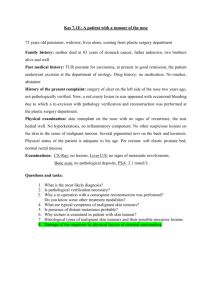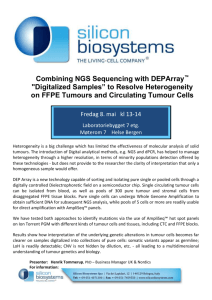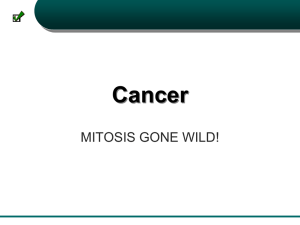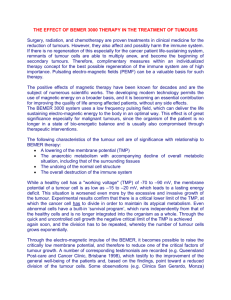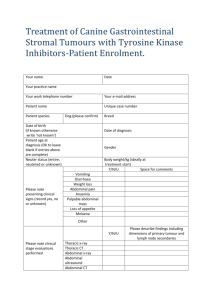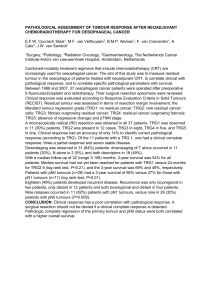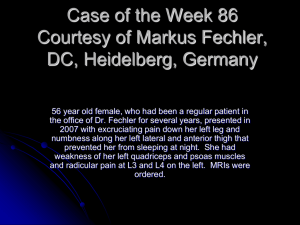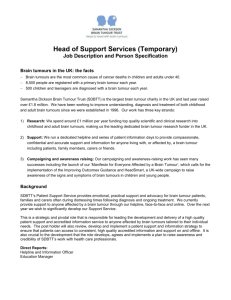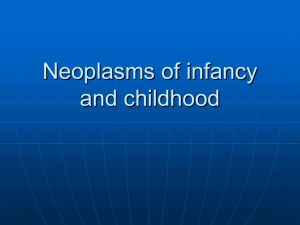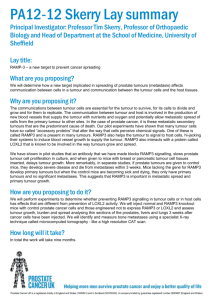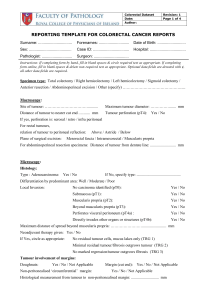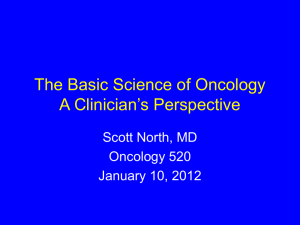STORY-SLIDES - Bedside to Bench
advertisement
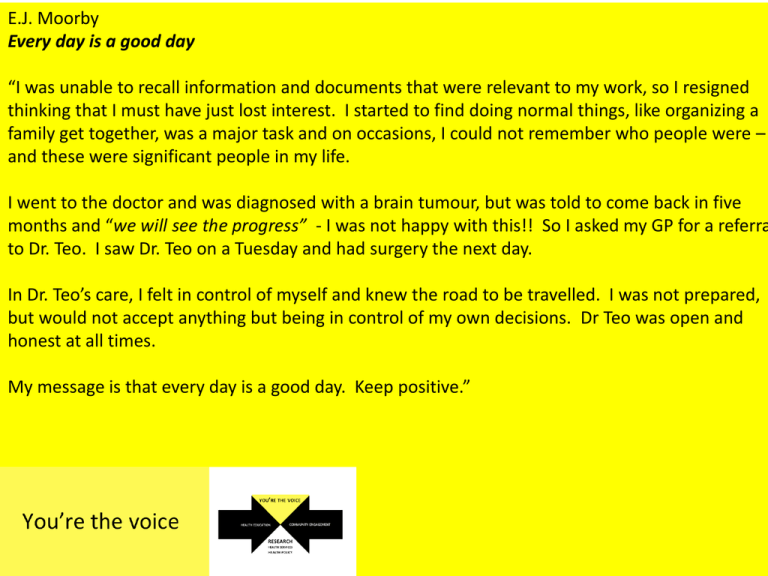
E.J. Moorby Every day is a good day “I was unable to recall information and documents that were relevant to my work, so I resigned thinking that I must have just lost interest. I started to find doing normal things, like organizing a family get together, was a major task and on occasions, I could not remember who people were – and these were significant people in my life. I went to the doctor and was diagnosed with a brain tumour, but was told to come back in five months and “we will see the progress” - I was not happy with this!! So I asked my GP for a referra to Dr. Teo. I saw Dr. Teo on a Tuesday and had surgery the next day. In Dr. Teo’s care, I felt in control of myself and knew the road to be travelled. I was not prepared, but would not accept anything but being in control of my own decisions. Dr Teo was open and honest at all times. My message is that every day is a good day. Keep positive.” Marcella – Carer If the cancer doesn’t kill me, your bloody driving will If anyone had told me 6 years ago that I would be telling a story about brain cancer, I would have said they were dreaming. It also highlights how one’s life can change in a split second. I hope is that by telling my story, I can help other families who are confronted with brain cancer, especially how to be optimistic despite the outcome. From the moment Stan was diagnosed, we sprang into action. Out motto was ‘no sad sacks here’. We were like two peas in a pod and didn’t want to be away from each other for any length of time We went through everything and every stage together - the diagnosis, denial, becoming a team and facing whatever challenges arise, telling family and friends, organizing treatment – e.g. surgery, radiation, chemotherapy, facing the reality that you could lose your soul mate and partner, organizing finances and dishing out the drugs. Most importantly, we made every day a special day and never gave up. More than anything, I hold on to the positive. Spending every waking moment together seeing the birth of a new grandchild, having a family holiday and celebrating a milestone birthday. We embraced our daughter and her family with great joy and affection. Our grandson was a God send and always brought great joy into our home. I still miss Stan and always will. I would like to think that time heals all hearts. Renee, 38 ACT Get involved! I was working full time, studying for my MBA and was a single mother to two young children, when my tumour was accidently discovered after a skiing accident knocked me unconscious. After the initial shock of being in hospital …after a CT scan in the emergency department revealed a mass. I was misdiagnosed and sent home from hospital. I used my own social network to get referred to Sydney and had surgery at Royal Prince Alfred Hospital (RPA). My surgery was filmed for the RPA television show which was a really positive experience, and I was able to have other newly diagnosed patients reach out to me for support. I later became involved with the Brain Tumour Alliance Australia(BTAA). I am a consumer representative in the Senate Committee regarding changes to the Pharmaceutical benefits Scheme and have presented my story in a number of forums. I have also been involved in fundraising and raised $45,000 for BTAA and Cure For Life Foundation at a Gala Dinner – I’m starting to arrange another fundraiser as well to support biobanking. I am lucky to be well enough to be an advocate for the cause and I am passionate about encouraging others to get involved. Bec, NSW You can always do more that you think you can My father was diagnosed with a brain tumour in 2008. I was 15 years old at the time and the eldest of his four children. Dad had a tireless commitment and passion for supporting the work of the Cure For Life Foundation (CFLF) and raising funds and awareness for further research. Following my Dad’s passing from brain cancer in 2011, I established a medical research grant within the framework of the Cure For Life Foundation (CFLF) to continue his legacy of support in raising funds and awareness for brain cancer and CFLF. The Beach Walk for Brain Cancer was also established, attracting over 1,300 participants and raisin over $200,000 in the first two years to help fund selected research projects within CFLF’s research priorities. My story is ongoing and focuses on the positive change and empowering the local community. “You can always do more than you think you can” – this is something my Dad showed me and I know I will live by. Trudi, NSW Together – everyone achieves more My own journey was with breast cancer. I wanted to give back to the community but felt the breast cancer movement was strong and that my efforts would probably be felt more in the brain cancer awareness arena. I decided to support the Tony Lucas Research Grant and their initial Beach Walk. This was a lot of hard work but led to success with funds starting to grow. The second Beach Walk surpassed our expectations and we were able to channel funds to researchers. We were also able to leverage support from local councils, media and further awareness. The work that we are all doing is meeting the many challenges of people affected by brain cancer, working to change perceptions and understanding, and raising research funds making life better for everyone. The events that I have been involved with have been very successful annual events, bringing survivors and families together where every cent raised will fund the cure for life. Together, everyone achieves more – whether it is fundraising or collaborative research. There is so much to achieve in brain cancer and it is a big ask, but it is possible and the world can do it! Susan Pitt, Braddon ACT (57) Mother of Patient. We need the support of the community My vision is for all newly diagnosed patients and their families to have access to high quality brain tumour care coordinators. My 19 year old son was diagnosed with a brain tumour – a pilocystic astrocytoma of the thalamus producing hydrocephalus. He was offered no hope in Canberra Hospital, so we went to Sydney where Dr. Teo operated on him. He had a good neurological outcome, but at age 21 he had to have a second operation – none of this came cheaply for us. My son could have died from a benign tumour but for the skills and courage of Dr. Teo. It took a few years for him to recover, but he completed his university degree with Honours in Molecular Biology and a Masters in Public Health. He found a job that suited his skills and is the founding Chair of the Brain Tumour Alliance Australia. Brain tumours are a devastating disease. We need the support of the community to help us find a cure for life and support those living with brain tumours. Matt Pitt, Brain Tumour Survivor, Canberra Please join our effort to help people with brain tumours Up to my mid-teenage years I had a very happy life. By the time I was 19, I had lost most of my friends, deferred university and was essentially mute in that I found it was very hard to speak. I had no energy and poor memory. I went to a GP, then to hospital where they detected a large brain tumour (6cm2) in the middle of my brain with acute hydrocephalus. The local hospital told us that there were only poor treatment option available. Through friends we found a specialist surgeon who treated me and preserved my memory using an advanced surgical technique. When I was sick, I was told that I had little hope of a normal life. It was an insider tip that proved otherwise. I survived and started getting on with my life but started to feel very sorry for the state of brain tumour patient care in Australia. I looked back at the hole that I had been in and though I want to help to pull other people out of that hole. We need choices, information, support and access to equitable and quality care. So I co-founded a support and advocacy group for brain tumour patients and carers in Australia. I realised that there is always more that you can do. Please join our effort to help people with brain tumours. “More communication and research and mutual consultation” Brian, long time brain tumour survivor I have had three operations and 2 rounds of radiation – and still going. Far more research should be followed up significantly. A brain tumour is complicated in various ways. People need to be communicated with. For researchers it is important to let people know your efforts, research outcomes, and direction. For patients, we need to provide encouragement to other people with tumours. Identifying, talking and discussing the tumour you have will also assist in the research component and progress in the appropriate areas. Whoever the audience is, they need to remember the positive stories – my story for example and how long my tumour existed. Doctors across the board need to give patients encouragement; don’t sit and ignore them. Research can only commence by the patients outlining and talking about their specific tumour and the side effects. This will also encourage and increase communication. Brain tumours are complex and research may take many many years unless they communicate together. The degree of tumours in the brain is far less than prostate, lung, kidney, skin, breast, but far more emphasis is needed within the brain area.
